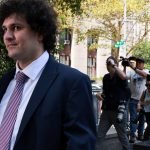Elon Musk declared artificial intelligence “one of the most disruptive forces in history” in a sit down conversation with British Prime Minister Rishi Sunak that dove into the dangers and opportunities of AI on Thursday, capping off the UK’s inaugural AI Safety Summit.
“AI will be a force for good most likely,” Musk said. “But the probability of it going bad is not zero percent.”
The two men spoke in an interview-style chat from a stage at Lancaster House, a government venue in central London often used for diplomatic purposes, before the conversation was opened up to questions from journalists. The conversation was then posted for streaming on Musk’s personal account on X, the social media site formerly known as Twitter that he owns.
Musk was present throughout the two-day event held mainly at Bletchley Park, the headquarters for the Allied Forces codebreaking program during World War II, along with US Vice President Kamala Harris, OpenAI CEO Sam Altman, and other notable politicians and global tech leaders. Chinese officials were also present at the event.
“I’m glad to see at this point that people are taking AI seriously,” Musk said to Sunak on Thursday. “Thanks for this summit. I think it will go down in history as quite important.”
Musk unpacked several predictions for AI, including a future where no jobs would be necessary and AI companionship would be one of the highest forms of friendship.
In office for just over a year, Sunak has restored some calm to British politics, but also faced challenges over his elite background, having studied at the exclusive Winchester College, Oxford and Stanford universities. Before entering politics, he worked for banks and hedge funds, including Goldman Sachs.
In the first day of his AI event, more than 25 countries and the European Union signed the Bletchley Declaration, agreeing to work together to create a united approach to oversight in efforts to deploy AI technology in a “human-centric, trustworthy and responsible” way, underscoring the “potential for serious, even catastrophic, harm” that many tech leaders have expressed concern over.
Musk and world leaders
Musk’s conversation with Sunak is one of numerous chats with world leaders the SpaceX and Tesla CEO has joined in the past few months. It showed his growing influence in geopolitical affairs as well as various technology and industrial sectors.
Musk met with Israeli Prime Minister Benjamin Netanyahu in September, weeks before the outbreak of the Israel-Hamas war. Netanyahu met with Musk to discuss artificial intelligence and antisemitism on the Musk-owned social media platform X, formerly known as Twitter, at a time Musk was warring with the Anti-Defamation League.
Musk also sat down with French President Emmanuel Macron numerous times in the past year. Other big names that recently made time for Musk in their schedule include Italian Prime Minister Giorgia Meloni in June, Indian Prime Minister Narendra Modi in June and Turkish President Recep Tayyip Erdogan in September.
At the event Thursday, Musk noted that if the AI powerhouses such as the United States and the UK “are aligned on AI safety, that is a good thing.” And he suggested other global powers such as China should also remain involved in discussions.
He compared AI to a magic genie and noted that fairy tales with magic genies that grant wishes “don’t end well” and cause people to “be careful what you wish for.”
Musk has increasingly become a fixture in international affairs, making headlines not only for his meetings with heads of state but also for the provision – or lack thereof – of SpaceX’s Starlink satellite services in war-torn regions.
The billionaire received backlash this week for pledging to provide aid organizations in Gaza with Starlink satellite service as the besieged strip struggles with internet connectivity. The Israeli Minister of Communications Shlomo Karhi said on X that Hamas “will use it for terrorist activities.”
“Perhaps Musk would be willing to condition it with the release of our abducted babies, sons, daughters, elderly people. All of them! By then, my office will cut any ties with starlink,” Karhi posted.
Musk made the announcement on X after US Democratic Rep. Alexandria Ocasio-Cortez said that “cutting off all communication to a population of 2.2 million is unacceptable.”
“Starlink will support connectivity to internationally recognized aid organizations in Gaza,” Musk said in a post replying to Ocasio-Cortez.
In Walter Isaacson’s new biography of the eccentric billionaire titled “Elon Musk,” it was revealed that Musk secretly ordered his engineers not to turn on his company’s Starlink satellite communications network near the Crimean coast last year to disrupt a Ukrainian sneak attack on the Russian naval fleet. CNN was provided the excerpt, which has since been amended, according to a version now published by The Washington Post.
Musk’s decision, which left Ukrainian officials begging him to turn the satellites on, was driven by an acute fear that Russia would respond to a Ukrainian attack on Crimea with nuclear weapons, a fear driven home by Musk’s conversations with senior Russian officials, according to Isaacson.
The billionaire’s presence at the UK’s summit brings an increased level of media attention to the event that is key to Sunak’s hope for global AI regulation.
Sunak and Musk discussed how digital super-intelligence could affect the public and require regulation the same way industries such as aviation and cars that require regulation.
“I agree with the vast majority of regulations,” Musk said, noting he quibbles with 1 percent or fewer regulations. “A referee is a good thing.”
At the same time, Musk reiterated his “fairly utopian” belief that AI could create an “age of abundance” with “no shortage of goods and services.” He says AI could lead to a future where “no job is needed” and people enjoy a universal high income. He mentioned a world of AI tutors and companionship for people like his son who has learning disabilities and difficulty making friends.
The next AI safety summit are set to be hosted by Korea and France and are scheduled for 2024.
CNN’s Luke McGee, Ivana Kottasová and Sean Lyngaas contributed to this report.
Read the full article here




